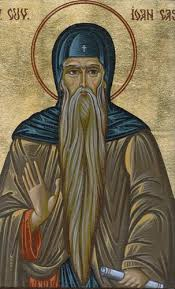John Cassian (born circa 360 AD) wrote the following in Conference VIII – The Second Conference of Abbot Serenus – On Principalities – Chapter XXI – The Answer to the Question Raised:
After the death of righteous Abel, in order that the whole human race might not spring from a wicked fratricide, Seth was born in the place of his brother who was slain, to take the place of his brother not only as regards posterity, but also as regards justice and goodness. And his offspring, following the example of their father’s goodness, always remained separate from intercourse with and the society of their kindred descended from the wicked Cain, as the difference of the genealogy very clearly tells us, where it says: “Adam begat Seth, Seth begat Enos, Enos begat Cainan, but Cainan begat Mahalaleel, but Mahalaleel begat Jared, Jared begat Enoch, Enoch begat Methuselah, Methuselah begat Lamech, Lamech begat Noah.” And the genealogy of Cain is given separately as follows: “Cain begat Enoch, Enoch begat Cainan, Cainan begat Mahalaleel, Mahalaleel begat Methuselah, Methuselah begat Lamech, Lamech begat Jabal and Jubal.” And so the line which sprang from the seed of righteous Seth always mixed with its own kith and kin, and continued for a long while in the holiness of its fathers and ancestors, untouched by the blasphemies and the wickedness of an evil offspring, which had implanted in it a seed of sin as it were transmitted by its ancestors.
As long then as there continued that separation of the lines between them, the seed of Seth, as it sprang from an excellent root, was by reason of its sanctity termed “angels of God,” or as some copies have it “sons of God”…

John Cassian does not elaborate as the statement was merely a portion of a reply to another issue.
He seems to be missing the mark on the Genesis 6 affair on a least two levels.
One is that he does not interpret sons of God within the Bible’s own context including other appearances of the term and the concept which derives from it within context.
Second is that he presuppose that there is some sort of genetic component to sin so that Seth had to be born “in order that the whole human race might not spring from a wicked fratricide” so that Seth’s lineage would be just and good, “the holiness of its fathers and ancestors, untouched by the blasphemies and the wickedness of an evil offspring, which had implanted in it a seed of sin as it were transmitted by its ancestors.”
Seth’s descendants most likely remained separate from Cain’s because Cain moved away from the religion where Adam and Eve lived and thus, where Seth and his descendants lived.
Of interest may be that some of two of the mentioned names within both Seth’s and Cain’s lineage carry include the Hebrew term “el” which is a reference to God within this context and, actually, the names are the same in both lineages: Mahalaleel and Methuselah.
On John Cassian view, and the view of all who hold to his view, the sons of God are exclusively males and exclusively of Seth’s lineage. Furthermore, on his view the daughters of men are exclusively females and exclusively of Cain’s lineage. Yet, why solely one gender from one lineage and one gender from the other?
Of interest may be a footnote to this section within the Philip Schaff book Sulpitius Severus, Vincent of Lerins, John Cassian:
In Gen. vi. 2 the mss. of the LXX. fluctuate between ἄγγελοι τοῦ θεοῦ [angels of God] and υἱοὶ τοῦ θεοῦ [sons of God]. The interpretation of the passage which Cassian here rejects is adopted by Philo and Josephus, the book of Enoch, and several of the early fathers, including Justin Martyr, Tertullian, Clement of Alexandria, Lactantius and others.
The explanation, which Cassian here gives, taking the “sons of God” of the Sethites, and the “daughters of men” of the line of Cain, is apparently first found in Julius Africanus (οἰ ἀπό τοῦ Σὴθ δίκαιοι [essentially, this reads “the righteous by Seth”] ), and is adopted among others by Augustine, De Civitate Dei, Book XV. xxiii., where the passage is fully discussed.
